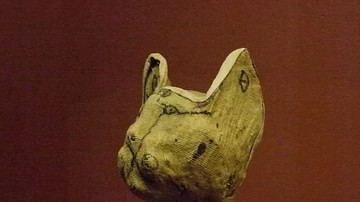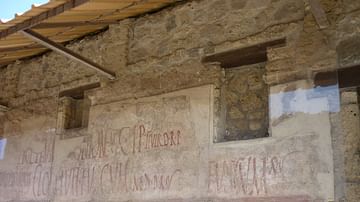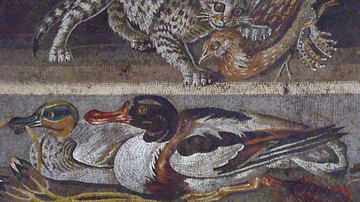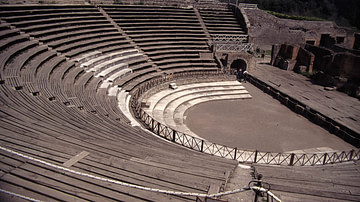Search Images
Browse Content (p. 1669)

Image
Yin and Yang
The Chinese yin and yang are an important element of Chinese philosophy and religion, representing the principle that all things exist as inseparable and contradictory opposites, the correct balance of which creates harmony. They are mutually...

Image
Vishnu
A bronze statue of the Hindu god Vishnu represented as the avatar Kurma, the giant tortoise, 18th-19th century CE. (British Museum, London).

Image
Cat Mummy
A mummified cat from Egypt, late Ptolemaic Period.
Rosicrucian Egyptian Museum, San Jose, California.

Image
Bastets & Sekhmets
A collection of Egyptian Bastet and Sekhmet figurines illustrating the importance of cat iconography in Egyptian culture.
Ashmolean Museum, Oxford.

Image
Electoral Notices, Pompeii
Many of the buildings in the Roman town of Pompeii, preserved following the burial of the town by the eruption of Mt. Vesuvius in 79 CE, were covered in electoral notices and graffiti on all manner of subjects.

Image
Fresco, Pompeii
A Fresco (c. 60 CE) from the Roman town of Pompeii depicting Terentius Neo holding a scroll and his wife who holds a stylus and writing tablet. From the Villa di Guilia Felice. The villas of Pompeii were richly decorated with wall paintings...

Image
Mosaic, Pompeii
A mosaic from the Roman town of Pompeii, buried by the eruption of Mt. Vesuvius in 79 CE. Such fine mosaics were a common feature of floors in the villas of the town and depicted scenes from mythology, the owner's business interests or, as...

Image
Theatre, Pompeii
The theatre of the Roman town of Pompeii was built in the 2nd century BCE and it was extensively renovated c. 79 BCE and repaired following the earthquake of 62 CE. At full capacity the theatre would have seated 5,000 spectators.

Image
Basilica, Pompeii
A portion of the 2nd century BCE Basilica of the Roman town of Pompeii, the oldest surviving example of such a building from the Roman world. In the Roman world the basilica was used for any large gathering and was the typical location of...

Image
Aerial View of Pompeii
A black and white photo taken c. 1900 CE of the Roman town of Pompeii, buried in volcanic ash following the eruption of Veusvius in 79 CE. In the foreground are two theatres.